 Petzlover
Petzlover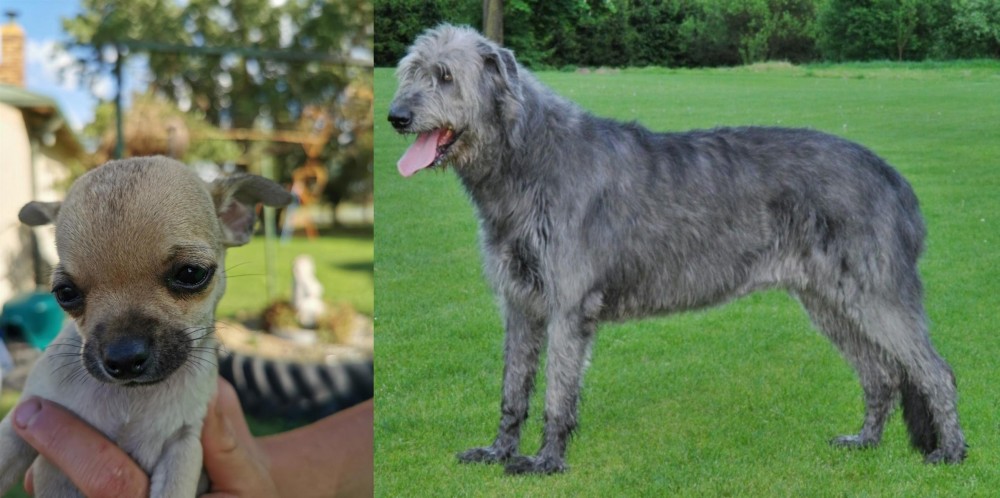 Chihuahua is originated from Mexico but Irish Wolfhound is originated from Ireland. Chihuahua may grow 63 cm / 24 inches shorter than Irish Wolfhound. Chihuahua may weigh 50 kg / 110 pounds lesser than Irish Wolfhound. Chihuahua may live 10 years more than Irish Wolfhound. Both Chihuahua and Irish Wolfhound has almost same litter size. Chihuahua requires Low Maintenance. But Irish Wolfhound requires Moderate Maintenance
Chihuahua is originated from Mexico but Irish Wolfhound is originated from Ireland. Chihuahua may grow 63 cm / 24 inches shorter than Irish Wolfhound. Chihuahua may weigh 50 kg / 110 pounds lesser than Irish Wolfhound. Chihuahua may live 10 years more than Irish Wolfhound. Both Chihuahua and Irish Wolfhound has almost same litter size. Chihuahua requires Low Maintenance. But Irish Wolfhound requires Moderate Maintenance
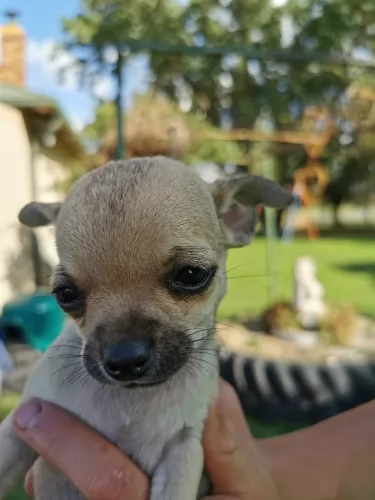 Quite a bit of the Chihuahua’s history is shrouded in mystery, and there are different versions about its origins.
Quite a bit of the Chihuahua’s history is shrouded in mystery, and there are different versions about its origins.
While historians speculate, most will agree that the tiny dog hails from Mexico. The UK Kennel Club considers the smooth- and long coat Chihuahuas as 2 distinct breeds.It was in 1904 that the Chihuahua became a registered breed by the American Kennel Club.
Chihuahua is actually the name of a state in Mexico, and it is amazing that Chihuahua specimens were found way back in the 1800's already. Today the Chihuahua is a very popular dog breed in several countries.
 It is believed that the Irish Wolfhound is an ancient breed and that it was brought to Ireland as early as 7000 BC.
It is believed that the Irish Wolfhound is an ancient breed and that it was brought to Ireland as early as 7000 BC.
These dogs were bred as hunting dogs as well as guard dogs. There was a time when these huge canines were only allowed to be owned by the nobility. The breed died out somewhat, but Scotsman Captain George Augustus Graham made efforts to restore the breed’s numbers.
Captain Graham devoted his life to making sure the Irish Wolfhound’s numbers were built up, and the breeding program included Great Danes, Borzois, English Mastiffs and Scottish Deerhounds.
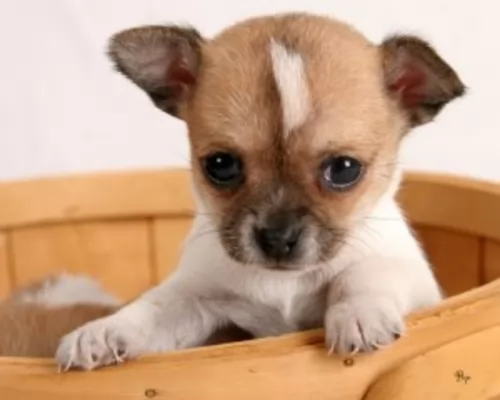 The small Chihuahua stands at about 15 – 23 cm and he weighs about 1,5 – 4kg.
The small Chihuahua stands at about 15 – 23 cm and he weighs about 1,5 – 4kg.
You’ll notice that he shivers when he is excited or when he is cold or frightened. Some people buy him a jersey to don on cooler days. With this tiny toy dog, you get a short- and a long coated Chihuahua.
This is the smallest dog breed and his coat is available in a number of colors such as fawn, tan, white and black. It is the dog’s round apple-shaped head which is a distinctive feature. He has erect ears and huge fruit-bat type eyes.
The Chihuahua is such an alert, fun-loving, feisty little dog, and though he may appear to be an ideal pet for children, he actually isn’t. He is too dainty and frail, and a child, during play, could accidentally crush him.
It’s a pity though because he just loves being around his human family. He is also a highly strung dog, and given the chance, he’ll nip and even bite during games. It is why socialization and training are considered important for the Chihuahua.
Just like with children, how you raise and treat your Chihuahua will determine how he turns out. He is such a sweet little dog that training and socialization can remove these unwanted characteristics. He is very intelligent and responds well to training.
 The tallest of the sighthounds, the Irish Wolfhound looks like a large Greyhound, only he has a rough, wiry type of coat.
The tallest of the sighthounds, the Irish Wolfhound looks like a large Greyhound, only he has a rough, wiry type of coat.
He is also gracefully built and known as a gentle giant. The double coat which can be fawn, red, white, grey, black or brindle is straight to wavy.
He stands at about 81 to 86cm and weighs roughly 48 to 54kg. This is one of the few dog breeds that you can’t really call social. He loves his own human family, and becomes unhappy and ‘down-in-the-dumps’ when separated from his family members for too long. He is a quiet dog who tends to be somewhat introverted and reserved, while being highly intelligent.
He will require being trained and socialized to make him obedient as he is an independent dog. He takes his role as family protector seriously and even though he is quiet, he is ready to take on anyone who threatens his property.
The Irish Wolfhound is a gentle, quiet, soft-natured, easy-going dog and even though it is such a large dog, it doesn’t throw it’s weight around but is calm and patient around the elderly and children in the home. It can tend to be aggressive with animals he isn’t familiar with.
He is an intelligent dog, but even so he may be quite resistant to training as he is strong-willed and determined to have his own way. These dogs need to be trained and socialized otherwise they just do their own thing.
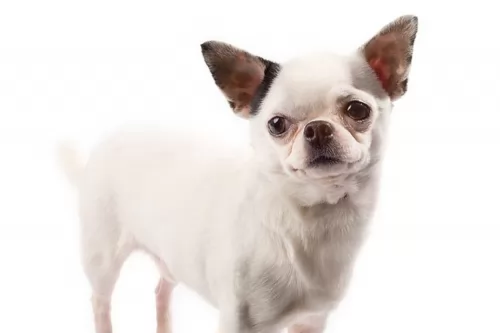 Small and feisty, the Chihuahua’s personality isn’t set in stone, and the tiny dog can be either shy and timid or he can be social, confident and jaunty.
Small and feisty, the Chihuahua’s personality isn’t set in stone, and the tiny dog can be either shy and timid or he can be social, confident and jaunty.
They're always loyal and affectionate to their human owners, but they don’t get on too well with- and are wary of small children who aren’t disciplined and who could hurt them.
With his big eyes and big ears together with his comical antics, they can be a source of entertainment for their human owners. He is easy to train too and even though he is small, he doesn’t think he is, and he is willing to use his big personality to make you a loving, loyal and devoted companion.
 The most notable aspect of the Irish Wolfhound is his amazing height. The legs are long, the body narrow. He is gentle and easy-going but because he is a sighthound he loves to give chase after animals.
The most notable aspect of the Irish Wolfhound is his amazing height. The legs are long, the body narrow. He is gentle and easy-going but because he is a sighthound he loves to give chase after animals.
He is capable of living in the city or countryside, but your home will need to cater to his size. He isn’t particularly energetic, enjoying a quiet life but he will absolutely need to be exercised.
Provide your gentle giant with everything needed to make him content, and you’ll have a faithful, loving friend for about 10 years.
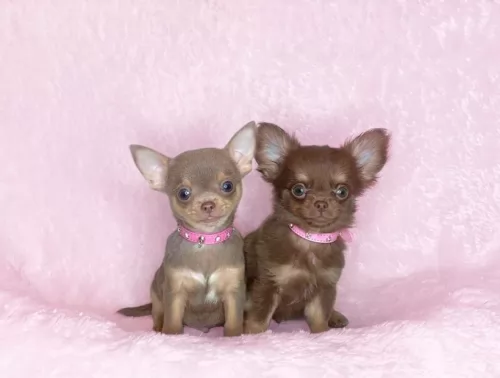 The Chihuahua doesn't have any particular health issues, more so when you get him from a reputable breeder. With good care he can reach 20 years of age.
The Chihuahua doesn't have any particular health issues, more so when you get him from a reputable breeder. With good care he can reach 20 years of age.
Known as low blood sugar, hypoglycemia is easily treatable, but if it isn’t caught early it can be fatal.Hypoglycemia makes a dog lethargic and he’ll shiver and could go into a coma. Get him to the vet immediately.
Gastric Dilatation or bloat is when the stomach twists, it becomes enlarged and blood supply is cut off to the stomach. Left untreated, it can be fatal.
Chihuahuas are susceptible to dental problems, so you will need to brush his teeth 2 or 3 times a week to prevent tartar build-up, gum disease, loss of teeth and other diseases.
 One wonders why breeders seem so bent on breeding such large dogs when they have health issues and they don't live particularly long. Not only do they cost a fortune to feed, but large dogs like this are more prone to illnesses and won’t live as long as small dog breeds. This big dog can live up to 10 years of age or so.
One wonders why breeders seem so bent on breeding such large dogs when they have health issues and they don't live particularly long. Not only do they cost a fortune to feed, but large dogs like this are more prone to illnesses and won’t live as long as small dog breeds. This big dog can live up to 10 years of age or so.
For starters, just because he is a deep chested dog, bloat or gastric torsion can be a threat. Other illnesses to look out for are dilated cardiomyopathy and bone cancer.
This is a disease of the heart muscle where the enlarged heart won’t function properly. The upper- and lower chambers of the heart are enlarged and the heart isn’t able to pump blood out properly. When the heart’s ventricle doesn’t pump enough blood into the lungs, fluid accumulates in the lungs and this ultimately leads to congestive heart failure.
Older dogs battle more with this heart disease and it is also more common in some dog breeds of which the Irish Wolfhound is one. Your dog will have shortness of breath, coughing and abdominal distension. He will need to get to the vet for medical tests.
Bone cancer can strike any dog, but you’ll find in more commonly with larger dog breeds. It can spread quickly and the long term prognosis isn’t good. It’s not easy to pick the disease up and it can mean joint pain for your pet and even lameness.
Your dog will be tired too. Your vet will do X-rays and other tests, but unfortunately the prognosis isn’t usually good. Big-dog breeders should take this into consideration.
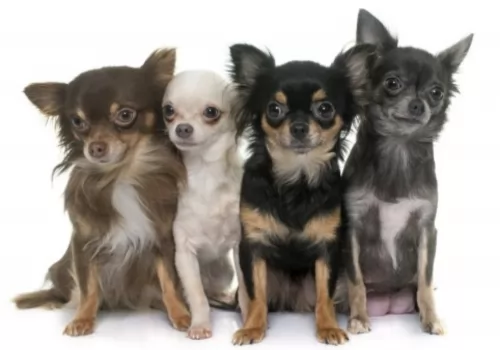 Always make sure to choose a high-quality dog food for your Chihuahua as this will keep him in tip-top health. A healthy Chihuahua can live to be 20 years of age. Speak to a veterinarian for recommendations on the best type of food to feed your tiny pet.
Always make sure to choose a high-quality dog food for your Chihuahua as this will keep him in tip-top health. A healthy Chihuahua can live to be 20 years of age. Speak to a veterinarian for recommendations on the best type of food to feed your tiny pet.
Giving him some home-made food such as brown rice, vegetables and cooked chicken for instance will be a welcome treat for him. Make sure he always has a bowl of fresh, cool water close by.
The Chihuahua may well be the smallest toy sized dog breed, but don’t be mistaken – he has plenty of energy and is constantly prancing around. He is more than capable of living in a small apartment, but even so he needs to be taken outside every now and then for a game or a walk.
Be careful with your small pet though, as too much exercise can lead to elbow- and hip dysplasia.
The Chihuahua is a moderate shedder with Spring being their heavier shedding period. Because of his small size, you won’t be bothered by too much hair. The short haired Chihuahua is easy to maintain and with a rubber brush, you can brush him gently twice a week.
You’ll also need to clip his nails and if you can’t manage this your vet can also help you.
 This isn’t a particularly energetic dog and he can tend to become lazy. Don’t allow this as becoming unfit and overweight can be very bad for such large dog. Being so large already puts stress on the dog’s body, and the dog is already susceptible to cardiac and skeletal problems. Allowing him to become lazy and overweight will be a death sentence for this large dog. It is imperative to make sure you take him on walks and play games with him.
This isn’t a particularly energetic dog and he can tend to become lazy. Don’t allow this as becoming unfit and overweight can be very bad for such large dog. Being so large already puts stress on the dog’s body, and the dog is already susceptible to cardiac and skeletal problems. Allowing him to become lazy and overweight will be a death sentence for this large dog. It is imperative to make sure you take him on walks and play games with him.
The coat of your dog is thick and medium length and he will require being brushed at least twice a week. You may want to also trim the longer hair you find around his face and legs.
When it comes to his ears, you can moisten some cotton wool and wipe the inside of his ears to remove dirt and excess wax. Remember not to probe too deeply to avoid damaging the ear. If you’re uncertain how to do this, your vet can explain to you how its done.
Check his teeth regularly as dental disease can affect other areas of the body too. Don’t allow his nails to get too long as they can cause paw problems and the nails can hook onto things and cause injury.
Because this is a giant breed, the puppy will grow for a long time. Speak to your vet about how to ensure you feed your puppy in such a way that he doesn’t grow too quickly.
If you feed your dog a commercially manufactured food, make sure its one of the top quality brands. Include home-made cooked food such as chicken, rice and vegetables into his kibble from time to time, and also try to feed him some raw meat occasionally.
Fresh, cool water must be available to your Irish Wolfhound around the clock.